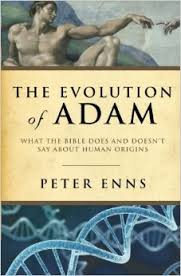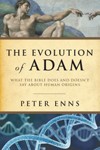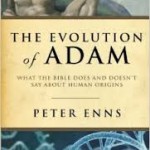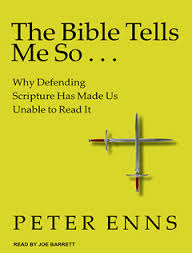 I began getting seriously involved in the Christianity/evolution “controversy” in 2009, which led to my 2012 book The Evolution of Adam: What the Bible Does and Doesn’t Say about Human Origins
I began getting seriously involved in the Christianity/evolution “controversy” in 2009, which led to my 2012 book The Evolution of Adam: What the Bible Does and Doesn’t Say about Human Origins .
.
The debate over the historical Adam continues in an entirely predictable manner: the theological needs of the evangelical system lead to patterns of responses that are aimed at protecting that system rather than addressing the serious theological issues introduced by evolutionary science and modern biblical scholarship on Genesis.
Below are the 11 patterns (“recurring mistakes”) I see, though others could be added, I’m sure. They are in no particular order.
1. It’s all about the authority of the Bible.
I can understand why this claim might have rhetorical effect, but this issue is not about biblical authority. It’s about how the Bible is to be interpreted. It’s about hermeneutics.
It’s always about hermeneutics.
I know that in some circles “hermeneutics” is code for “let’s find a way to get out of the plain meaning of the text.” But even a so-called “plain” or “literal” reading of the Bible is a hermeneutic—an approach to interpretation.
Literalism is a hermeneutical decision (even if implicit) as much as any other approach, and so needs to be defended as much as any other. Literalism is not the default godly way to read the Bible that preserves biblical authority. It is not the “normal” way of reading the Bible that gets a free pass while all others must face the bar of judgment.
So, when someone says, “I don’t read Genesis 1-3 as historical events, and here are the reasons why,” that person is not “denying biblical authority.” That person may be wrong, but that would have to be judged on some basis other than the ultimate conversation-stopper, “You’re denying biblical authority.
The Bible is not just “there.” It has to be interpreted. The issue is which interpretations are more defensible than others. Hence, appealing to biblical authority does not tell us how to interpret the Bible. That requires a lot more work. It always has.
“Biblical authority” is a predisposition to the text. It is not a hermeneutic.
2. You’re giving science more authority than the Bible.
This, too, may have some rhetorical effect, but it misses the point.
To say that science gives us a more accurate understanding of human origins than the Bible is not putting science “over” the Bible—unless we assume that the Bible is prepared to give us scientific information.
There are numerous compelling reasons to think that Genesis is not prepared to provide such information—namely the fact that Genesis was written at least 2500 years ago by and for people, who, to state the obvious, were not thinking in modern scientific terms.
One might respond, “But Genesis was inspired by God, and so needs to be true.”
That assertion assumes that “truth” is essentially synonymous with historical accuracy and that a text inspired by God in antiquity would, by virtue of its being the word of God, need to give scientific rather than ancient accounts of origins.
These assumptions would need to be vigorously defended, not merely asserted as unimpeachable fact.
Lying behind this error in thinking is the unstated assumption that the Bible, as the word of God, must predetermine the conclusions that scientific investigations can arrive at on any subject matter the Bible addresses.
To make this assumption is to run roughshod not only over commonsense, but over the very notion of the contextual and historically conditioned nature of Scripture.
If Scripture were truly given priority over science in matters open to scientific inquiry, the church would have never gotten past Galileo’s discovery that the earth revolves around the sun.
3. But the church has never questioned the historicity of Adam.
This claim is largely true—though it obscures the symbolic value especially early interpreters found in the Garden story, but I digress.
On the whole, this statement is correct. It is also irrelevant.
Knowing what the history of the church has thought about Adam is not an argument for Adam’s historicity, as some seem to think, since the history of the church did not have evolution or any scientific discoveries to deal with until recently.
That’s the whole point of this debate—evolution and ancient texts that put the biblical story in its cultural context are new factors we have to address.
Appealing to periods in church history before these things were on the table as authoritative and determinative voices in the discussion simply makes no sense. What Augustine, Aquinas, Luther, Calvin, and the Puritans assumed about human origins is not relevant—and to say so is not a dismissal of the study of church history, historical theology, etc., but to put them in their place.
Calling upon church history does not solve the problem; it simply restates it. Appealing to church history does not end the discussion; it just reminds us why we need to have the discussion in the first place.
4. Both Paul and the writer of Genesis thought Adam was a real person, the first man. Denying the historicity of Adam means you think you know better than the biblical writers.
More rhetorical punch, but this assertion simply sidesteps a fundamental interpretive challenge all of us need to address on one level or another.
All biblical writers were limited by their culture and time in how they viewed the physical world around them. This is hardly a novel notion of inspiration, and premodern theologians from Augustine to Calvin were quite adamant about the point.
No responsible doctrine of inspiration can deny that the biblical authors were thoroughly encultured, ancient people, who spoke as ancient people. Inspiration does not cancel out their “historical particularity,” no matter how inconvenient.
Any notion of inspiration must embrace and engage the notion that God, by his Spirit, speaks within ancient categories.
We do indeed “know more” than the biblical writers about some things. That alone isn’t an alarming theological problem in prciniple. But that principle has become a problem because it now touches on an issue that some feel is of paramount theological importance—the historical Adam.
The stakes have been raised in ways no one expected, for now we understand that the ancient biblical authors’ understanding of human origins is also part of their ancient way of thinking.
Should the principle be abandoned when it becomes theologically uncomfortable?
As I see it, the whole discussion is over how our “knowing more” about human origins can be in conversation with the biblical theological metanarrative. This is the pressing theological challenge before us and it needs to be addressed deliberately and without rancor, not avoided or obscured.
Acknowledging that we know more than biblical writers about certain things is not to disrespect Scripture. We are merely recognizing that the good and wise God had far less difficulty condescending to ancient categories of thinking than some seem to be comfortable with.
5. Genesis as whole, including the Adam story, is a historical narrative and therefore demands to be taken as an historical account.
It is a common, but nevertheless erroneous, assumption that Genesis, as a “historical narrative,” narrates history.
Typically the argument is mounted on two related fronts:
(1) Genesis mentions by name people and places; we are told that people are doing things and going places. That sounds like a sequence of events, and therefore should be taken as “historical.”
(2) Genesis uses a particular Hebrew verbal form (waw consecutive plus imperfect) that is used throughout Old Testament narratives to present a string of events—so-and-so did this, then this, then went there and said this, then went there and did that.
As the argument goes, we are bound to conclude that a story that presents people doing things in a sequence is an indication that we are dealing with history.
That may be the case, but the sequencing of events in a story alone does not in and of itself imply historicity. Every story, whether real or imagined, has people doing things in sequences of events.
This does not mean that Genesis can’t be a historical narrative. It only means that the fact that Genesis presents people doing things in sequence is not the reason for drawing that conclusion.
The Lord of the Rings masterfully records in great and vivid detail people (and others) doing things in sequence. But is it still pure fiction. A Tale of Two Cities does the same, but that doesn’t make it a reliable guide to historical events.
The connection between Genesis and history is a complicated, multifaceted issue that many have pondered in great depth. The issue certainly cannot be settled simply by reading the text of Genesis and observing that people do things in time.
6. Evolution is a different “religion” (i.e., “naturalism” or “Darwinism”) and therefore hostile to Christianity.
Certainly for some evolution functions as a different “religion,” hostile to Christianity or any believe in a world beyond the material and random chance.
But that does not mean that all those who hold to evolution as the true explanation of human origins think of evolution as a religion. Nor does it mean that evolutionary theory requires one to adopt an atheistic “naturalistic” or “Darwinistic” worldview.
Christian evolutionists do not see their work in evolutionary science as spiritual adultery. Christian evolutionists take it as a matter of deep faith that evolution is God’s way of creating, the intricacies of which we cannot (ever) be fully comprehend.
In other words, “evolution=naturalistic atheism,” although rhetorically appealing, does not describe Christians who hold to evolution. Their convictions should be taken at face value, rather than suggesting that they have been duped or are compromising their faith Christians.
7. Since Adam is necessary for the Christian faith, we know evolution can’t be true.
Evolution causes theological problems for Christianity. There is no question of that. We cannot simply graft evolution onto evangelical theology and claim that we have reconciled Christianity and evolution.
The theological and philosophical problems for the Christian faith that evolution brings to the table are hardly superficial. They require much thought and a multi-disciplinary effort to work through. For example:
- Is death a natural part of life or unnatural, a punishment of God for disobedience?
- What does it mean to be human and made in God’s image?
- What kind of God creates a process where the fittest survive?
- How can God hold people responsible for their sin if there was no first trespass by a first human couple?
A literal, historical, Adam answers these and other questions. Without an Adam, we are left to find other answers. Nothing is gained by papering over this dilemma.
But, here is my point: The fact that evolution causes theological problems does not mean evolution is wrong. It means we have theological problems.
Normally, we all know that we cannot judge if something is true on the basis of whether that truth is disruptive to us. We know it is wrong to assume one’s position and then evaluate data on the basis of that predetermined conclusion.
We are also normally very quick to point out this logical fallacy in others. If an atheist would defend his/her own belief system by saying, “I reject this datum because it does not fit my way of thinking,” we would be quick to pounce.
The truth of a historical Adam is not judged by how necessary such an Adam appears to be for theology. The proper response to evolution is to work through the theological challenges it presents (as many theologians and philosophers are doing), not dismiss the challenge itself.
8. Science is changing, therefore it’s all up for grabs.
Science is a self-critical entity, and so it should not surprise us to see developments, even paradigm shifts, in the near and distant future.
Is the universe expanding or oscillating? Are there multiple universes? How many dimensions are there? What about dark matter and dark energy? How many hominids constituted the gene pool from which all alive today have descended? And so forth.
But the fact that science is a changing discipline does not mean that all evolutionary theory is hanging on by a thread, ready to be dismissed at the next turn.
Also, the fact that science is self-correcting doesn’t mean that, if we hold on long enough, sooner or later, the changing nature of science will eventually disprove evolution and vindicate a literal view of Genesis.
Change, development, even paradigm shifts in scientific work, are sure to come, and to point that out is hardly a penetrating insight: that is how science works. But further discoveries will take us forward, not backward.
9. There are scientists who question evolution, and this establishes the credibility of the biblical view of human origins.
Individual, creative, innovative thinking often leads to true advances in the human intellectual drama. I would say that without these pioneering voices pushing the boundaries of knowledge, there would be no progress.
However, the presence of minority voices in and of itself does not constitute a counterargument to evolution.
Particularly in the age of the Internet, it is not hard at all to find someone with a Ph.D. in a relevant field who lends a countervoice to mainstream thinking. This is true in the sciences, in biblical studies, and in any academic field.
One can always find someone out there who thinks he or she has cracked the code, hidden to most others, and disproved the majority. And, in my experience, too often the promotion of minority voices is laced with a fair dose of conspiracy theory, where the claim is made that one’s view has been ostracized simply because it challenges the establishment.
Those without training in the relevant fields are particularly susceptible to following a minority voice if it confirms their own thinking. But simply having a Ph.D., having research experience, or even having written papers on minority positions, does not establishe the credibility of minority positions.
The truthfulness of minority claims must be tested over time by a body of peers, not simply accepted because those claims exist and affirm our own positions.
10. Evidence for and against evolution is open to all and can be assessed by anyone.
Since evolutionary theory is the product of scientific investigation, it follows that those best suited to evaluate the scientific data and arguments are those trained in the relevant sciences—or better those who are practicing scientists and therefore are keeping up with developments.
The years of training and experience required of those who work in fields that touch on evolution rules out of bounds the views of those who lack such training.
This is certainly the case with those who have no scientific training whatsoever beyond basic high school and college courses. I certainly fall into that category, which is why I don’t feel I can enter into scientific discussions, let alone critique them.
Engaging scientific issues requires serious scientific training—which only a fraction of the earth’s population can claim to have.
My point is that most of us do not have a place at the table where the assessment of evidence is the topic of discussion. I include here philosophers of science, historians of science, and sociologists of science. These disciplines look at the human and historical conditions within which scientific work takes place, this giving us the big picture of what is happening behind the scenes intellectually and culturally.
Science is not a “neutral” endeavor, and these fields are invaluable of putting science into a broader intellectual context. I am all for it.
But I have often seen practitioners of these disciplines, without any high-level scientific training, overstep their boundaries by passing judgment on evolution on the basis of the big-picture context these disciplines provide.
Evolution cannot be judged from 30,000 feet. You still have to deal with the scientific data in detail.
I think I stand on very solid ground when I say that these various disciples need to be in conversation with each other, not one standing in judgment over the other.
Simply put, you have to know what you are talking about if you want to debunk evolution. If you want to take on the scientific consensus, you have to argue better science that stands the test of peer review, not better ideology.
11. Believing in evolution means giving up your evangelical identity.
Many arguments I have heard against evolution come down to this: my evangelical ecclesiastical group has never accepted it, and so, to remain in this group, I am bound to reject it too.
It is rarely stated quite this bluntly, but that’s the bottom line.
But, as is well known, in recent decades the term “evangelical” has become a moving target. Is evangelicalism a stable, unchanging movement, or is it flexible enough to be open to substantive change?
Or an even more fundamental consideration: should maintaining evangelical identity at all costs even be the primary concern?
These may be the most important questions for evangelicals to consider when entering into the discussion over the historical Adam.
(This list is an edited collection of a four-part series that I posted in 2011.)
 Over at Books and Culture, I have been participating in a roundtable discussion concerning the historical Adam. The occasion is the launch of Karl Giberson’s latest book Saving the Original Sinner: How Christians Have Used the Bible’s First Man to Oppress, Inspire, and Make Sense of the World
Over at Books and Culture, I have been participating in a roundtable discussion concerning the historical Adam. The occasion is the launch of Karl Giberson’s latest book Saving the Original Sinner: How Christians Have Used the Bible’s First Man to Oppress, Inspire, and Make Sense of the World.
 biological first man, then what we believe is false. Since what we believe is true, this consequence is unacceptable and we are therefore well within our right—indeed it is our sacred obligation—to do what is necessary to neutralize evolution by simply declaring it false.”
biological first man, then what we believe is false. Since what we believe is true, this consequence is unacceptable and we are therefore well within our right—indeed it is our sacred obligation—to do what is necessary to neutralize evolution by simply declaring it false.”











